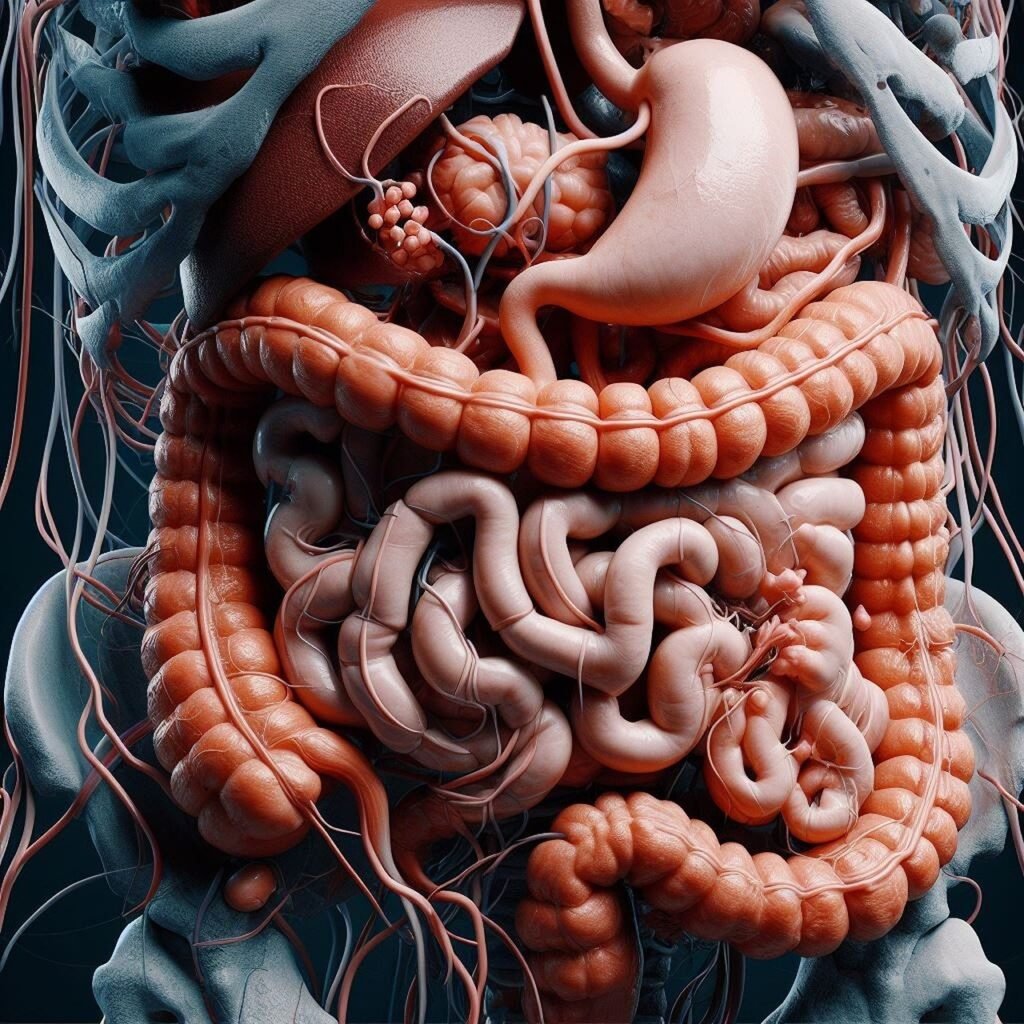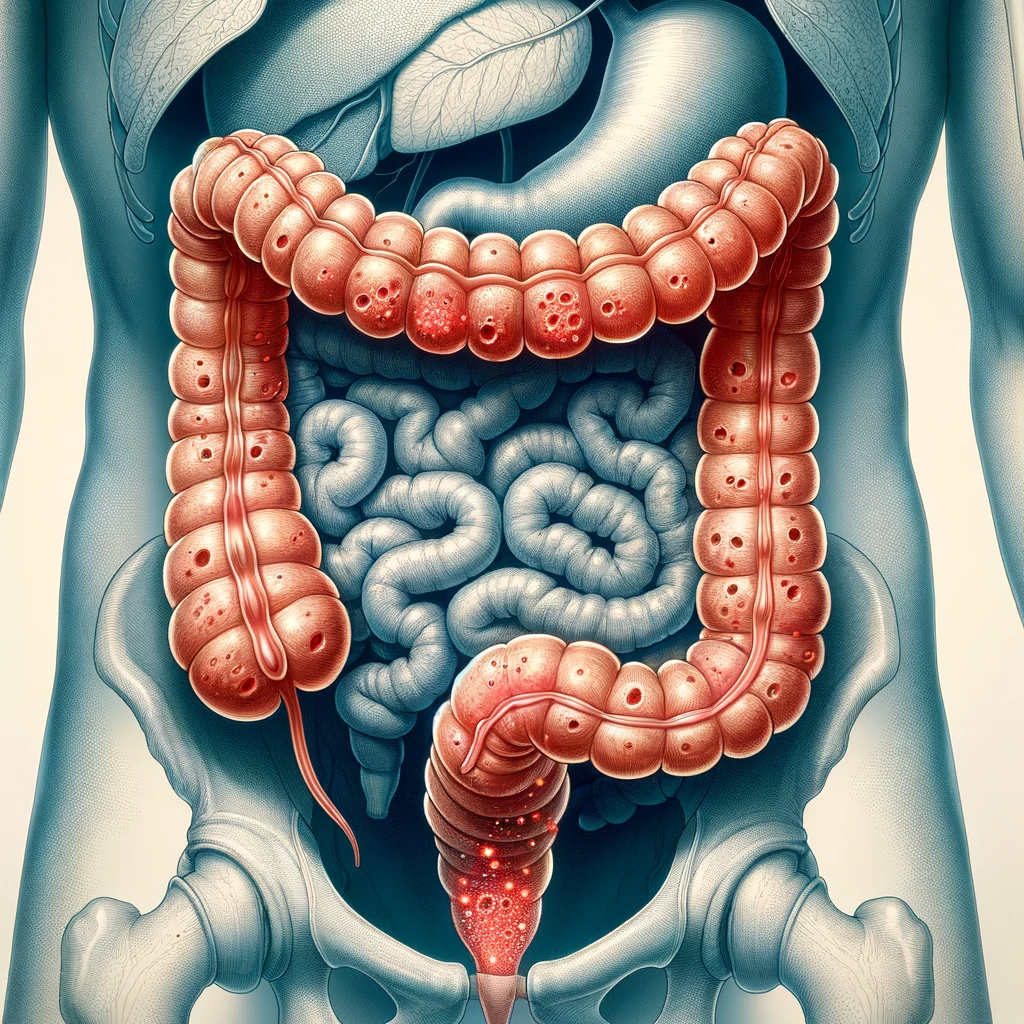Are you experiencing bloating, cramps, or skin issues? It could be leaky gut syndrome. Leaky gut happens when the lining of your intestines becomes damaged and allows toxins and undigested food particles to enter your bloodstream, leading to inflammation and a host of other issues. But don’t worry, there’s a solution!
By following a leaky gut diet plan, you can reduce inflammation, heal your gut lining, and improve your overall health. In this post, we’ll dive into what leaky gut is and its common symptoms and causes. We’ll also cover how diet plays a vital role in managing leaky gut and what foods to include in your diet for optimal gut health. We’ll even provide sample meal plans and suggest probiotics to enhance the effectiveness of your diet. And if that’s not enough, we’ll also discuss advanced diet options and alternatives. So let’s get started on the journey to healing your gut!
Understanding Leaky Gut Syndrome
The intricate ecosystem of gut bacteria plays a crucial role in the development of leaky gut syndrome, influencing chronic inflammation and autoimmune diseases. This condition can significantly impact digestive health, leading to symptoms such as brain fog and irritable bowel syndrome. The intestinal permeability and the delicate balance of good and bad bacteria within the intestinal lining are essential factors. Early identification of these symptoms is vital for a medical diagnosis and to mitigate the potential risks of chronic diseases, including cardiovascular disease and heart disease.
The Science behind Leaky Gut
The intestinal lining’s tight junctions play a crucial role in gut health, regulating permeability. The gut microbiota, comprised of good and bad bacteria, greatly influences leaky gut syndrome. Research suggests a strong link between leaky gut and food sensitivities, impacting digestive health. Gut dysbiosis, an imbalance in gut bacteria, is of significant concern in leaky gut syndrome. Understanding these mechanisms is vital in addressing chronic diseases like cardiovascular disease and irritable bowel syndrome. Recognizing the impact of waste products passing through the intestinal wall is important in managing mental health and chronic stress.
Common Symptoms and Causes
Recognizing digestive issues associated with leaky gut syndrome is crucial for early intervention. Understanding how undigested food particles contribute to the condition helps in making dietary adjustments. Identifying harmful substances that affect gut health, like artificial sweeteners and waste products, is essential. Chronic fatigue linked to leaky gut syndrome underscores the connection between gut health and mental well-being. The role of bad bacteria and chronic stress in intestinal inflammation cannot be overstated, as they contribute to a range of chronic diseases, including cardiovascular disease.
Role of Diet in Managing Leaky Gut
Implementing an elemental diet is crucial for managing leaky gut syndrome, supporting the healing of the intestinal lining and reducing symptoms like brain fog. The correlation between leaky gut syndrome and inflammatory bowel disease emphasizes the need for a tailored diet plan to address chronic inflammation. A healthy gut diet plays an important role in cultivating good bacteria, preventing bad bacteria from entering the bloodstream, and eliminating waste products. Dietary changes, including reducing chronic stress and addressing mental health, support overall gut health and prevent the progression of chronic diseases such as cardiovascular disease and irritable bowel syndrome.
How Food Affects Your Gut Health
Understanding how food affects your gut health is crucial in managing leaky gut syndrome. The impact of dairy products on the intestinal wall can exacerbate symptoms, while fatty acids play an important role in maintaining intestinal health and reducing inflammation. Furthermore, recognizing the link between gut health and celiac disease can aid in identifying potential triggers for gut inflammation. Incorporating foods that support good bacteria and reduce bad bacteria can help in maintaining a healthy digestive tract and preventing chronic disease. Additionally, whole grains play an important role in promoting a healthy gut and mitigating the effects of leaky gut syndrome.
Importance of a Personalized Diet Plan
Tailoring a diet plan to individual health conditions is crucial in addressing gut health. Understanding how this plan can address food sensitivities and manage gut dysbiosis is key. Implementing a low FODMAP diet supports gut health by reducing fermentable carbohydrates. Additionally, addressing gut dysbiosis through personalized eating plans helps in nurturing good bacteria while minimizing waste products of bad bacteria. This approach plays an important role in managing chronic diseases and chronic stress, which have a direct impact on mental health and the digestive tract.

Foods to Include in Your Leaky Gut Diet
Incorporating chia seeds into your leaky gut diet plan supports a healthy intestinal lining and reduces inflammation. Sweet potatoes play a crucial role in supporting digestive health and can help combat symptoms like brain fog. Foods promoting a healthy gut microbiome, such as fermented foods, aid in restoring good bacteria. Vitamin D is vital for reducing chronic stress and preventing chronic diseases like cardiovascular disease. Olive oil supports a healthy gut lining by reducing inflammation in the digestive tract.
Fruits, Vegetables and Grains
Exploring the advantages of incorporating whole foods into a leaky gut diet to promote gut health. Choosing fruits and vegetables that aid in preventing leaky gut syndrome. Understanding the significance of brown rice in promoting gut health within a leaky gut diet plan. Including beneficial bacteria from fermented foods to support a healthy gut wall in a leaky gut diet. Selecting foods that contribute to maintaining a healthy gut wall and overall digestive health.
Protein Sources and Dairy Alternatives
Incorporating plant-based protein sources into a leaky gut diet plan for gut health is essential. Exploring dairy alternatives for a leaky gut diet is crucial in maintaining a healthy digestive tract. Coconut milk plays a vital role as a dairy alternative and supports the intestinal wall. Selecting lean protein sources is important to prevent leaky gut syndrome and promote good bacteria in the gut. It’s imperative to identify foods for a leaky gut diet that provide essential amino acids to support mental health and prevent chronic disease.
Herbs, Spices and Beverages to Consider
Incorporating a variety of gut-friendly herbs and spices can play a crucial role in supporting digestive health and maintaining the integrity of the intestinal lining. Additionally, carefully choosing beverages that are known to support gut health and prevent issues like leaky gut syndrome can further contribute to overall well-being. Herbal teas, for example, have been shown to promote a healthy gut microbiota through their unique properties. When exploring the benefits of incorporating gut-healing herbs and spices into a leaky gut diet plan, it’s important to consider their potential impact on reducing inflammation and supporting the growth of good bacteria within the digestive tract.
Foods to Avoid for a Healthy Gut
Artificial sweeteners can harm the intestinal lining and contribute to gut dysbiosis, leading to chronic disease. Dairy products can exacerbate symptoms of leaky gut syndrome, causing inflammation in the small intestine. Gluten-rich foods may trigger gut inflammation and digestive issues, increasing the risk of cardiovascular disease. Processed foods high in unhealthy fats and sugars can disrupt the balance between good and bad bacteria in the digestive tract, leading to chronic stress. It’s important to avoid salad dressings with harmful emulsifiers that can compromise the intestinal wall integrity, leading to irritable bowel syndrome and mental health issues.
Harmful Food Additives and Emulsifiers
Artificial food additives and emulsifiers have the potential to disrupt the delicate balance of your gut microbiota. These additives, commonly found in processed foods, can contribute to intestinal inflammation, leading to gut dysbiosis and leaky gut symptoms. The impairment of gut health and reduction in gut microbiome diversity caused by these harmful substances can result in gut inflammation and digestive problems. It’s crucial to be mindful of the impact of these additives on your gut health and overall well-being, and make informed choices to support the intestinal lining and the good bacteria within.
Potential Triggers for Leaky Gut
The digestive system can be sensitive to certain triggers that exacerbate gut inflammation and disrupt gut health. Gluten, artificial sweeteners, and harmful additives in processed foods can all contribute to gut dysbiosis, while dairy products may worsen gut inflammation and digestive discomfort. It’s important to note that gluten sensitivity can lead to gut inflammation and digestive issues, making it essential to be mindful of food choices. By understanding and avoiding these potential triggers, individuals can take proactive steps in managing their gut health and overall well-being.

Sample Meal Plans for Leaky Gut Diet
In crafting a leaky gut diet meal plan, focus on gut-friendly foods like bone broth and fermented vegetables to promote healing within the intestinal lining. Incorporate coconut milk and chia seeds, as they play an important role in nurturing good bacteria and restoring balance within the digestive tract. Consider an elemental diet consisting of easily digestible foods, and include whole grains and beneficial bacteria to aid in gut health restoration. Additionally, embracing a low FODMAP diet can effectively alleviate symptoms of leaky gut syndrome, promoting overall digestive wellness.
Breakfast Ideas
Starting your day with a nourishing meal is crucial for a leaky gut diet. Consider a chia seed pudding, packed with gut-healing properties, or a gut-friendly smoothie containing beneficial bacteria to support intestinal health. Low FODMAP options like eggs and spinach can be excellent choices for a breakfast that promotes gut wellness. Try a coconut milk chia pudding with added probiotics or gluten-free oats and almond milk for a gut-nourishing start to your day. These breakfast ideas, rich in good bacteria and low in potential irritants, play an important role in restoring gut health.
Lunch and Dinner Recipes
Supporting gut health with nourishing meals is essential for healing. A gut-healing lunch and dinner may include bone broth soup with leafy greens, aiding in the restoration of the intestinal lining. Incorporating fermented vegetables into recipes also supports gut health by promoting the growth of good bacteria, crucial for overall well-being. Additionally, preparing meals with whole foods like sweet potatoes and olive oil plays a vital role in supporting gut health and combating chronic diseases. Including lean protein and beneficial bacteria in lunch and dinner recipes further contributes to a healthy digestive tract and overall wellness.
Snack Suggestions
Aiding gut health involves nourishing snacks like chia seed pudding with coconut milk, gluten-free crackers with fermented vegetables, and mixed nuts and seeds. Low FODMAP fruits with coconut milk yogurt and bone broth with dairy-free cheese are also supportive options. These snacks help restore gut health by promoting good bacteria and supporting the intestinal lining. Incorporating gut-friendly snacks plays an important role in managing gut health, helping to reduce chronic stress and mental health issues associated with gut problems.
Enhancing Your Diet with Probiotics
When aiming to restore gut health, the best probiotics for leaky gut syndrome are those that support gut microbiome diversity. Incorporating probiotics with beneficial bacteria plays a crucial role in this process by aiding in gut health restoration and helping to restore gut microbiota balance. The timing for taking probiotics for leaky gut syndrome should be personalized based on individual gut health needs. Ultimately, the important role of probiotics in gut health restoration is to support a healthy gut microbiome, which is vital for overall well-being.
Best Probiotics for Leaky Gut Syndrome
When addressing leaky gut syndrome, incorporating probiotics containing beneficial bacteria like Lactobacillus and Bifidobacterium is essential. These beneficial bacteria support gut health and help restore gut microbiota balance for managing leaky gut syndrome. Additionally, including probiotics with gut-friendly strains such as Saccharomyces boulardii can aid in the management of this condition. It’s important to choose probiotics with diverse beneficial bacteria to support gut microbiome diversity and overall gut health. Lactobacillus acidophilus, for example, plays an important role in restoring gut microbiota balance and promoting gut health.
When and How to Take Probiotics
Taking probiotics with meals can shield good bacteria from stomach acids, aiding gut health. The best time to take probiotics depends on individual digestive needs, while intake frequency is based on gut microbiome requirements. Consumption of diverse beneficial bacteria through probiotics supports gut health. Incorporating probiotics into daily routines helps maintain gut health and microbiome diversity. By integrating probiotics strategically, individuals can protect and restore their intestinal lining, promoting overall well-being.
What If Diet Alone Doesn’t Help?
If you’re not seeing the desired results from your leaky gut diet, it might be time to explore alternative options. Consider advanced dietary approaches and consult a professional for personalized advice. Don’t get discouraged; keep modifying your diet to address any inadequate progress.
Advanced Diet Options and Alternatives
When addressing gut health, it’s essential to investigate specialized diets tailored for leaky gut syndrome. Exploring alternative leaky gut diet plans can lead to better results, especially when considering advanced dietary options to improve overall gut health. Customizing your leaky gut diet with advanced food choices and altering it with advanced dietary options can significantly impact the intestinal lining and the balance of good and bad bacteria in the digestive tract. These alterations play an important role in reducing chronic stress on the intestinal wall and minimizing the production of waste products that can contribute to chronic and cardiovascular diseases.
When to Seek Medical Advice
Persistent symptoms like brain fog, chronic stress, and digestive issues may indicate the need for medical diagnosis. Recognize signs such as chronic disease or cardiovascular disease. Understanding when to consult a professional for irritable bowel syndrome is crucial. Seek guidance for mental health related to gut health. Considering the important role of the intestinal lining in overall health, it’s essential to recognize when to seek medical help. Recognizing bad bacteria overgrowth and waste product buildup in the small intestine can also signal the need for professional medical advice.
Is the Leaky Gut Diet Suitable for Everyone?
Assess if a leaky gut diet is appropriate for your individual health needs. Consider the suitability of this diet plan in managing your condition. Evaluate if it aligns with your specific health goals and requirements. Explore if a leaky gut diet is suitable for enhancing your overall well-being.
Frequently Asked Questions
What can I eat if I have leaky gut?
Foods that support gut health are recommended for those with leaky gut. Opt for nutrient-dense options like bone broth, fermented vegetables, avocado, and wild-caught fish. Steer clear of gluten, dairy, processed foods, and sugar. Consult a healthcare professional for a personalized diet plan.
What is the fastest way to heal leaky gut?
The speed of healing leaky gut varies depending on the individual and the severity of their condition. Eliminating trigger foods like gluten, dairy, and processed food can help. Adding nutrient-dense whole foods such as bone broth, fermented vegetables, and healthy fats can aid in the healing process. Consulting with a healthcare professional or registered dietitian for personalized guidance is recommended.
What are the 3 signs of a leaky gut?
The three signs of a leaky gut include digestive issues such as bloating or diarrhea, inflammation that can manifest as joint pain or skin rashes, and a weakened immune system making you more susceptible to infections.
What foods does Dr Gundry say causes leaky gut?
Dr. Gundry suggests that certain foods containing lectins can contribute to leaky gut. These include grains, legumes, nightshade vegetables, and dairy. It’s also important to limit sugar and processed foods for optimal gut health. Remember to consult a healthcare professional before making significant dietary changes.
Conclusion
In conclusion, following a leaky gut diet plan can greatly improve your gut health and overall well-being. By understanding the science behind leaky gut syndrome and its common symptoms and causes, you can make informed choices about what foods to include and avoid in your diet. Focusing on fruits, vegetables, grains, and protein sources can help nourish your gut, while avoiding harmful food additives and triggers can prevent further damage.
Enhancing your diet with probiotics can also provide additional support for your gut health. However, it’s important to remember that diet alone may not always be enough, and seeking medical advice is recommended if you’re not seeing desired results. Each person’s journey with leaky gut syndrome is unique, so personalize your diet plan according to your needs and consult a healthcare professional for guidance.


